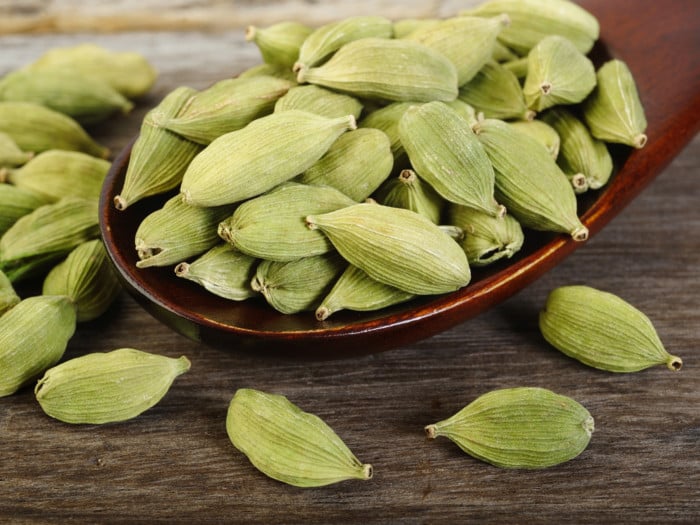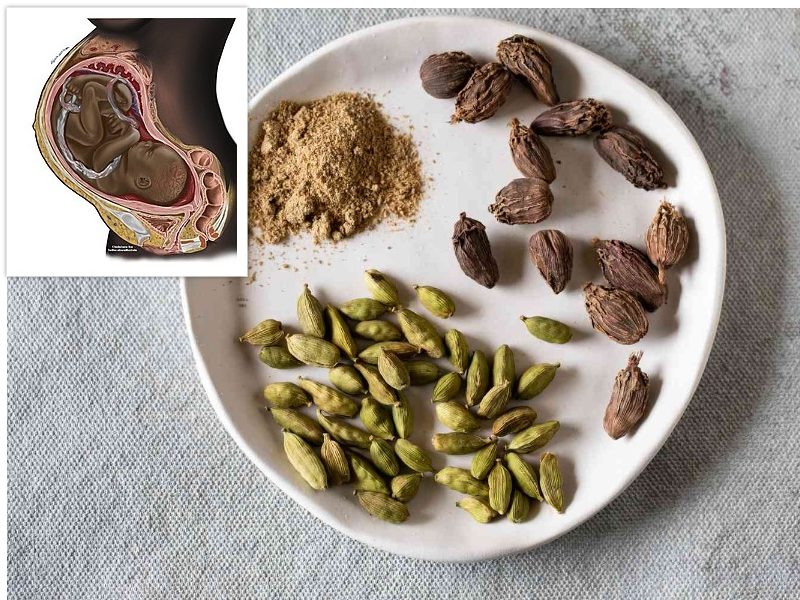Pregnancy is a time of joy, anticipation, and numerous lifestyle adjustments, including dietary considerations. Expectant mothers often scrutinize their food choices to ensure they are beneficial for both their health and the baby’s development. Among the myriad spices available, cardamom stands out for its unique flavor and potential health benefits.

This article delves into the safety, benefits, and potential risks of consuming cardamom during pregnancy, providing a comprehensive guide for expectant mothers.
Understanding Cardamom
Cardamom, known as the “queen of spices,” is a small green pod with black seeds inside. It belongs to the Zingiberaceae family, which includes ginger and turmeric. There are two main types of cardamom: green cardamom (Elettaria cardamomum) and black cardamom (Amomum subulatum). Green cardamom is more commonly used in cooking and has a sweet, aromatic flavor, while black cardamom has a smoky, robust flavor.
Nutritional Profile of Cardamom
Cardamom is not only valued for its flavor but also for its nutritional properties. It is rich in essential oils, vitamins, and minerals. A typical serving of cardamom contains:
- Vitamins: Vitamin C, riboflavin, and niacin.
- Minerals: Calcium, magnesium, potassium, and phosphorus.
- Other Compounds: Essential oils like cineole, terpinene, and limonene, which have antioxidant and anti-inflammatory properties.
Health Benefits of Cardamom During Pregnancy

Digestive Health: Cardamom is known for its digestive properties. It can help alleviate nausea, reduce bloating, and improve appetite. These benefits can be particularly helpful during pregnancy when digestive issues like morning sickness and constipation are common.
Antioxidant Properties: The antioxidants in cardamom can help combat oxidative stress, which is crucial during pregnancy as oxidative stress can harm both the mother and the developing fetus.
Anti-inflammatory Effects: Chronic inflammation can lead to various health issues. Cardamom’s anti-inflammatory properties can help reduce inflammation and improve overall health.
Oral Health: Cardamom is often used in Ayurvedic medicine for oral health. It has antimicrobial properties that can help maintain oral hygiene and prevent bad breath.
Blood Pressure Regulation: Some studies suggest that cardamom can help regulate blood pressure due to its diuretic properties, which can be beneficial for pregnant women prone to hypertension.
Mood Enhancer: The aroma of cardamom is believed to have mood-enhancing properties, which can help reduce stress and anxiety levels during pregnancy.
“Cardamom and Kidney Health: A Spice for Wellness”
Safety of Cardamom During Pregnancy
While cardamom offers numerous health benefits, its safety during pregnancy is a common concern. Generally, consuming cardamom in moderate amounts as a spice in food is considered safe during pregnancy. However, it is crucial to consider the following aspects:
- Moderation is Key: Like with many foods and spices during pregnancy, moderation is essential. Excessive consumption of cardamom could potentially lead to adverse effects.
- Allergic Reactions: Some individuals may be allergic to cardamom. It is advisable to consult with a healthcare provider before incorporating cardamom into the diet if there is a history of allergies.
- Herbal Supplements: While cardamom as a spice is generally safe, the use of cardamom supplements or essential oils should be approached with caution. The concentration of active compounds in supplements can be significantly higher than in food, potentially leading to adverse effects.
- Consult Healthcare Providers: Before making any significant dietary changes or adding new spices and herbs to the diet during pregnancy, it is always best to consult with a healthcare provider. They can provide personalized advice based on individual health needs and pregnancy progression.

Risks and Considerations of Cardamom During Pregnancy

Moderate Consumption
While cardamom offers numerous health benefits, it is crucial to consume it in moderation. Excessive intake of cardamom could potentially lead to adverse effects, including gastrointestinal discomfort and lowered blood pressure.
Allergic Reactions
Some individuals may be allergic to cardamom. Symptoms of an allergic reaction can include itching, swelling, and difficulty breathing. Pregnant women with a history of allergies should consult their healthcare provider before adding cardamom to their diet.
Herbal Supplements and Essential Oils
While cardamom as a spice is generally safe, the use of cardamom supplements or essential oils should be approached with caution. Supplements and oils contain concentrated amounts of active compounds, which can be significantly higher than those found in food. This concentration can increase the risk of adverse effects, and pregnant women should consult their healthcare provider before using these products.
Medication Interactions
Cardamom may interact with certain medications, potentially altering their effectiveness or causing side effects. Pregnant women taking prescribed medication should consult their healthcare provider to avoid potential interactions.
Uterine Stimulation
There are anecdotal claims that high doses of cardamom might stimulate the uterus, potentially increasing the risk of preterm labor. Although scientific evidence supporting this claim is limited, it is advisable to avoid consuming large amounts of cardamom during pregnancy.
Culinary Uses of Cardamom During Pregnancy

Incorporating cardamom into a pregnancy diet can be done in various delicious and nutritious ways. Here are some ideas:
Beverages: Cardamom can be added to teas, smoothies, and milk for a flavorful twist. A popular choice is cardamom tea, which can be soothing and help with digestion.
Baked Goods: Cardamom is a delightful addition to cookies, cakes, and bread. It pairs well with other spices like cinnamon and nutmeg.
Savory Dishes: Cardamom can enhance the flavor of rice dishes, curries, and stews. It is a staple in many Indian and Middle Eastern recipes.
Desserts: Cardamom is often used in desserts like rice pudding, custards, and fruit compotes, providing a unique and aromatic flavor.
Conclusion
Cardamom, with its rich flavor and numerous health benefits, can be a valuable addition to a pregnancy diet when used in moderation. Its digestive, antioxidant, and anti-inflammatory properties are particularly beneficial during pregnancy. However, it is essential to consume it safely and consult with a healthcare provider to ensure it fits well with individual health needs and pregnancy progression.
Pregnancy is a time of heightened sensitivity and care, and making informed dietary choices is crucial for the well-being of both the mother and the developing baby. When used appropriately, Cardamom can be a wonderful addition to a balanced and nutritious pregnancy diet.
